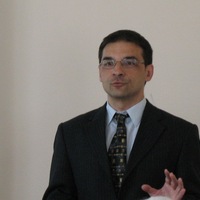
Ring Éva
PhD Éva Ring-ÁghAge: 70 yearsCitizenship: HungarianTitular professor University Eötvös Lóránd, Szentmiklósi út 97.BudapestFaculty of Humanities1213 HungaryEastern European History Department6-8, Múzeum krt.1088. Budapest, Hungaryphone: Direct: 361/266 9833/poste 5078 phone: / 361 425 0378E-mail: ring.eva@btk.elte.huEducation: 1969-1974 Eötvös Lóránd University, Philosophical Faculty, BudapestHistory, linguistics, sociology, archive siences,1971 Warsaw University, Philosophical FacultyPolish historyProfessional activity:1974-1978 scholar and teacher at the Departement of Medieval Historyof Hungary, Philosophical Faculty, Lóránd Eötvös University, Budapest. Teaching of medieval and early modern era Hungarian history.1978 - 1994:Researcher at the Central and Eastern European ResearchCentre of Hungarian Academy of Sciences.Teaching at Budapest University of Economics and at the Philosophical Faculty,1994 - Lóránd Eötvös University, Budapest: Rise of the nationalities problem, break out the nationalities conflicts in Habsburg Empire /1770s to 1849/.1996-1999 director of the Research Group of East-Central European HistoryHungarian Academy of Sciences-Budapest University of Economics1997- 1998 Senior adviser of the Government Office for hungarian minorities abrod1997 ass. Professor, University of Eötvös Lóránd, Faculty of Humanities, Eastern European History Dep.2001-2003. Visiting professor in France at the University Sorbonne nouvelle, Paris III. PhDr diploma Lóránd Eötvös University, 1977.PhD Diploma in history science 1995.Habilitation: 2003. (Eötvös Lóránd University)Field of research:Language and national revival in Central and Eastern European contries.Public education and national revival in the Habsburg Monarchie,History of Bookmarkets in HungaryLanguages spoken: French, Czech, Polish, GermanReading: English, Slovak.
less
Related Authors
Ferenc Tóth
Hungarian Academy of Sciences
Rákóczi István
Eötvös Loránd University
Patrik Dinnyés
Eszterházy Károly University
Milan Jenei
University of Szeged
Beáta Varga
University of Szeged
Imre Szakál
Ferenc Rakoczi II Transcarpathian Hungarian Institute
Csilla FEDINEC
Hungarian Academy of Sciences
Laszlo Biro
Institute of History of Hungarian Academy of Sciences









Uploads
Papers by Ring Éva
THE CONFEDERATION OF BAR AND THE FIRST TERRITORIAL MUTILATION
OF THE RZECZPOSPOLITA
The Confederation that was formed on 29 February 1768 in the Podolian town of Bar has been judged controversially in both public opinion and the scholarly literature. The aim of the present study is to call attention to some hitherto unknown factors that contributed to the formation and
working of the Confederation. Its initial hypothesis is that the formation of the Confederation of Bar actually played little role in the decision taken by the three great powers in 1772, but rather contributed to its rapid and aggressive implementation. The article first describes the background
to the formation of the Confederation of Bar, then the history of the Confederation, and finally the diplomatic negotiations that took place in the background. Instead of seeking to identify those who were responsible for the unfavourable turn of events for Poland, the author offers new perspectives. With the first mutilation of the Polish–Lithuanian state, great power expansion reached a new level. Previously, borders had been changed only in the event of war; now, in peacetime, Austria, Russia and Prussia have jointly shortened the borders of a fourth state, wrapping their ambitions in an international treat.
THE PROBLEM OF THE RULER’S LEGITIMACY IN LATE-EIGHTEENTH-CENTURY POLISH POLITICS
Few personalities in Polish history have attracted such general and enduring dislike as Stanisław Poniatowski. This dislike has mostly focussed on the king’s personality, the means of his gripping power, and on his real or imagined political faults. The present paper concentrates on two events: the election of Stanislaus Augustus and the Bar Confederation, which ushered in the kidnapping of the king. It is in the context of these events that the early conceptions of legitimacy and idoneity are explored. Over the eighteenth century, not only the Polish society but also the foreign public had come to accept the fact that the kings of Poland got their throne through Russian support, as in was reflecting the existing state of geopolitical relations. The kidnapping of the king, and the reception of its news in Europe, are a perfect illustration of the basic problem of the Bar Confederation, namely that the outside world held a different conception of state and kingship, and the person of the ruler, than did the Polish nobility. The absolute rulers of Europe made small account of what legitimacy meant in Poland; for them, the legitimacy of royal power sprang partly from the right of birth, partly from the consecration and the coronation ceremony.
Keywords: Partitions of Poland, Independence, Polish Social Party, Polish state, World War I.
The experiences of an Austrian commercial counsellor in Moscow based
on the 1774 diary of Karl von Zinzendorf
Count Karl von Zinzendorf, the commercial counsellor of the Habsburg Empire was beyond
doubt one of the most active travellers of the 18th century. In 12 years, he visited Switzerland,
Italy, French, Great Britain, Spain, Belgium, and Hungary, as well as distant locations like
Portugal, Sicily, or Transylvania. This study focuses on a short episode of his last big trip to
Eastern and Northern Europe: his stay in Moscow in August 1774. We believe that Zinzendorf’s
experiences in the old Russian capital deserve the attention of not only historians, but
wider audiences as well. The reason for this is that as an experienced traveller and expert on
economy he could form an unbiased opinion about what he saw and compare it to his experiences
in other countries, and he could evaluate the modernization efforts as well.
THE CONFEDERATION OF BAR AND THE FIRST TERRITORIAL MUTILATION
OF THE RZECZPOSPOLITA
The Confederation that was formed on 29 February 1768 in the Podolian town of Bar has been judged controversially in both public opinion and the scholarly literature. The aim of the present study is to call attention to some hitherto unknown factors that contributed to the formation and
working of the Confederation. Its initial hypothesis is that the formation of the Confederation of Bar actually played little role in the decision taken by the three great powers in 1772, but rather contributed to its rapid and aggressive implementation. The article first describes the background
to the formation of the Confederation of Bar, then the history of the Confederation, and finally the diplomatic negotiations that took place in the background. Instead of seeking to identify those who were responsible for the unfavourable turn of events for Poland, the author offers new perspectives. With the first mutilation of the Polish–Lithuanian state, great power expansion reached a new level. Previously, borders had been changed only in the event of war; now, in peacetime, Austria, Russia and Prussia have jointly shortened the borders of a fourth state, wrapping their ambitions in an international treat.
THE PROBLEM OF THE RULER’S LEGITIMACY IN LATE-EIGHTEENTH-CENTURY POLISH POLITICS
Few personalities in Polish history have attracted such general and enduring dislike as Stanisław Poniatowski. This dislike has mostly focussed on the king’s personality, the means of his gripping power, and on his real or imagined political faults. The present paper concentrates on two events: the election of Stanislaus Augustus and the Bar Confederation, which ushered in the kidnapping of the king. It is in the context of these events that the early conceptions of legitimacy and idoneity are explored. Over the eighteenth century, not only the Polish society but also the foreign public had come to accept the fact that the kings of Poland got their throne through Russian support, as in was reflecting the existing state of geopolitical relations. The kidnapping of the king, and the reception of its news in Europe, are a perfect illustration of the basic problem of the Bar Confederation, namely that the outside world held a different conception of state and kingship, and the person of the ruler, than did the Polish nobility. The absolute rulers of Europe made small account of what legitimacy meant in Poland; for them, the legitimacy of royal power sprang partly from the right of birth, partly from the consecration and the coronation ceremony.
Keywords: Partitions of Poland, Independence, Polish Social Party, Polish state, World War I.
The experiences of an Austrian commercial counsellor in Moscow based
on the 1774 diary of Karl von Zinzendorf
Count Karl von Zinzendorf, the commercial counsellor of the Habsburg Empire was beyond
doubt one of the most active travellers of the 18th century. In 12 years, he visited Switzerland,
Italy, French, Great Britain, Spain, Belgium, and Hungary, as well as distant locations like
Portugal, Sicily, or Transylvania. This study focuses on a short episode of his last big trip to
Eastern and Northern Europe: his stay in Moscow in August 1774. We believe that Zinzendorf’s
experiences in the old Russian capital deserve the attention of not only historians, but
wider audiences as well. The reason for this is that as an experienced traveller and expert on
economy he could form an unbiased opinion about what he saw and compare it to his experiences
in other countries, and he could evaluate the modernization efforts as well.